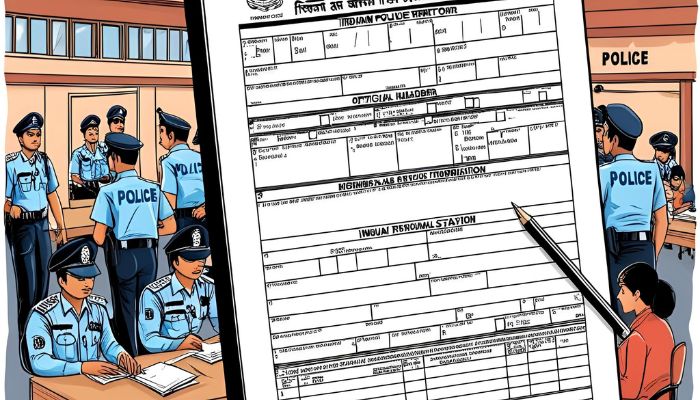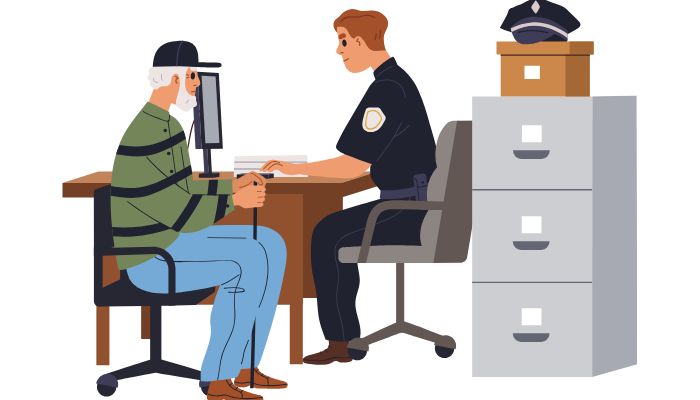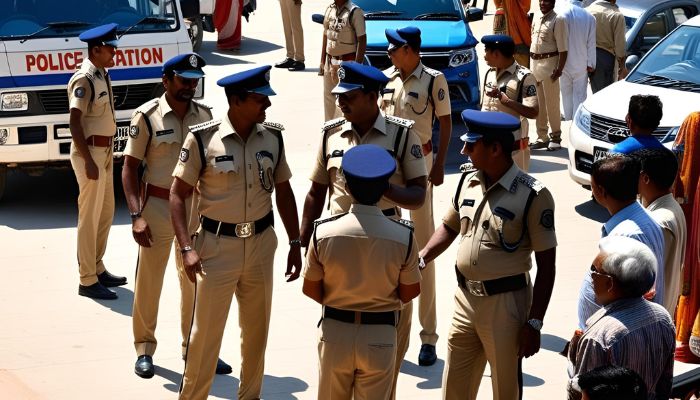
How to File an FIR Online in India – Step-by-Step Legal Guide
Learn how to register an FIR online, lodge e-FIRs for cybercrime, lost mobile, or theft, and understand the process across Indian states with legal validity and tips.

What is an FIR and Why It’s the First Step in Legal Redressal?
Filing a First Information Report (FIR) is the legal foundation of any criminal investigation in India. It officially brings a crime to the notice of the police and compels them to initiate action. An FIR can be filed for offenses like theft, assault, cybercrime, harassment, and more.
- FIR Full Form: First Information Report
- Legal Standing: Registered under Section 154 of the Criminal Procedure Code (CrPC)
- Initiates Investigation: Police must act once an FIR is filed
But in today’s digital world, many wonder how to file an FIR online from the safety of their homes—especially in urban cities like Delhi, Mumbai, or Bangalore. Let’s explore the modern process of FIR registration online and its legal validity.
Can You File an FIR Online in India?
Yes, several Indian states now allow citizens to file FIRs online for certain types of cases—especially non-cognizable offenses or incidents like mobile theft, cyber fraud, lost documents, etc.
- Online FIR Police Complaint: Accepted in major cities via dedicated portals
- Legal Validity: Same as physical FIR once acknowledged by the police station
- Immediate Acknowledgment: A copy of your complaint and diary entry number is shared digitally
States like Maharashtra, Delhi, Karnataka, and Uttar Pradesh offer the option to register FIR online. The process is especially helpful in lost mobile FIR online cases, passport theft, or cybercrime complaints.
So, can I file FIR online? – The answer is yes, but it depends on your location and the nature of the complaint. Let’s break down the steps.
How to File an FIR Online – Statewise Links and Procedure
The process varies slightly across states, but most online portals follow a general format. Here’s how to lodge an FIR online in India, step-by-step:
- Step 1: Visit the official state police website
- Step 2: Select ‘Citizen Services’ > ‘Report Complaint’ or ‘e-FIR’
- Step 3: Enter complaint details, date/time of incident, location
- Step 4: Upload supporting documents if any (like mobile bill, photos)
- Step 5: Submit and note down the acknowledgment number
Some states offer mobile apps to help file FIR online instantly, especially for lost mobile FIR or cybercrime FIR. Below are quick links to help you get started:
Types of FIRs – Normal FIR vs Zero FIR
When you file FIR online, it’s essential to understand the two major categories of FIRs in Indian law:
- Regular FIR: Filed at the police station where the offense occurred. Jurisdiction is fixed.
- Zero FIR: Can be filed at any police station, regardless of jurisdiction. Later transferred to appropriate station.
For example, if you lose your mobile in Mumbai but are currently in Delhi, you can file a Zero FIR in Delhi. It ensures prompt legal action without being bound by location.
Difference Between FIR and Police Complaint
The terms police complaint and FIR are often used interchangeably, but legally, they are different:
- FIR: Initiates a criminal case, must be for a cognizable offense, and leads to police investigation
- Police Complaint: Can be for both cognizable and non-cognizable offenses; FIR is not always registered automatically
So if you’re unsure whether to lodge an FIR online or just make a general complaint, check the nature of the crime first.
Can You File a Cybercrime FIR Online?
Yes. In fact, cybercrime is one of the most common areas where the option to file FIR online has proven extremely useful. From identity theft to online scams, hacking to cyberbullying—victims can file an e-FIR directly.
- Visit the National Cybercrime Reporting Portal
- Register and log in using mobile OTP
- Choose between reporting anonymously or with personal details
- Submit all incident details, screenshots, evidence, etc.
Once submitted, your complaint is routed to the concerned Cyber Cell. The process is swift and can often lead to timely action, especially in financial frauds.
When Should You File an FIR Online vs Offline?
While e-FIRs offer convenience, they aren’t applicable in every situation. Here’s when each method is appropriate:
- File FIR Online: Lost mobile, minor theft, cybercrime, missing documents
- File FIR Offline: Serious crimes like assault, rape, kidnapping (requires face-to-face reporting)
Online FIRs are mostly valid for non-cognizable and moderate complaints. For crimes involving serious physical harm or threats to life, police require in-person engagement.
Always call 100 or visit your nearest police station if the emergency is serious.
Legal Importance of FIR – Why It’s More Than Just a Complaint
Whether it’s a file FIR online or offline, an FIR is a legally binding document. It ensures:
- Criminal Record Begins: Initiates the chain of evidence and legal accountability
- Right to Legal Recourse: You can request bail, file a charge sheet, or approach court only after FIR
- Applicable to Legal Claims: FIRs are often needed for insurance, court cases, and official affidavits
For victims, it’s the first protection step. For accused, it’s the start of due process. Either way, the document holds crucial importance in Indian criminal law.
How to Withdraw an FIR in India

Filing an FIR is serious, but under certain circumstances, it is legally possible to withdraw it. Here’s how:
- Step 1: File an application in the same police station where the FIR was registered
- Step 2: Seek cancellation if no charge sheet has been filed
- Step 3: If charges have been framed, only the court can quash the FIR under Section 482 CrPC
In case of mutual settlements or misunderstandings, FIRs can be withdrawn but only through legal channels. Never attempt informal withdrawals—they hold no legal value.
FIR Format – What Details Are Required?
If you’re wondering how to write or understand an FIR, here’s what it usually includes:
- Name and address of complainant
- Date and time of occurrence
- Location of incident
- Details of the accused, if known
- Detailed description of the event or crime
You can download a sample format for reference:
How to Check FIR Status Online
Once you’ve submitted your online FIR, it’s essential to track its progress. You can check FIR status online through your state police portal:
- Enter FIR number and date
- Check progress notes or investigation stage
- Download a copy if needed
This is useful if your case involves insurance claims, visa processing, or court submission. It’s advisable to check weekly updates.
FAQs – File FIR Online in India
Can I file FIR online from any state?
Yes, but features vary by state. Zero FIR allows cross-jurisdiction complaints which are transferred later to the right police station.
Is e-FIR legally valid in India?
Absolutely. Once acknowledged by police, it carries the same legal weight as an in-person FIR.
Can I file FIR online for mobile theft?
Yes. You can file lost mobile complaints online in most states under citizen services.
How to register FIR online in Delhi, Mumbai, or Bangalore?
Each has a dedicated portal or app. For instance, Delhi Police has a Citizen Services portal. Refer to the links shared above for direct access.
Is it necessary to visit the police station after online FIR?
For minor offenses—usually not. But for serious matters, police may call you in for statements or verification.
Filing FIRs in Major Cities: Local Tips
Filing an FIR online varies slightly by region. Here’s how to navigate it in key Indian cities:
- Delhi: Visit delhipolice.gov.in > Lost & Found > Report Lost Article
- Mumbai: Use mumbaipolice.gov.in > Report Crime > Online Complaint
- Bangalore: Karnataka Police Portal provides e-lost article FIR facility
Urban areas also offer FIR acknowledgment via email and SMS, and you can later download your FIR in PDF format.
How to File FIR for Lost Mobile Online
Losing a mobile phone is one of the most common reasons people search for FIR file online. Filing a police complaint helps you:
- Block your IMEI number via CEIR portal
- Prevent misuse of your phone number
- Provide proof to service providers or insurance
Steps:
- Visit your state police’s lost article reporting page
- Enter IMEI, brand, model, and last seen location
- Receive digital acknowledgment copy
Online Police Complaint Process in India
Even if it’s not a full FIR, you can still initiate a police file complaint online using citizen grievance portals:
- State Police Complaint Portals (Delhi, Maharashtra, Karnataka, etc.)
- Centralized portals like Cyber Crime Portal
- Lost Property Portals
Remember, a complaint may or may not result in FIR registration. For serious cases, ensure you push for official FIR acknowledgment.
Time Limit to File FIR – Is There Any?
Legally, there’s no strict deadline for filing an FIR, but delay can weaken the case unless justified. Courts do consider reasons like:
- Fear of retaliation
- Lack of awareness
- Delayed discovery of offense (especially in cybercrime)
It is always advisable to file the FIR as early as possible to maintain credibility and protect evidence.
What If Police Refuses to File an FIR?
If you attempt to register FIR online or offline and police refuse, here’s what you can do:
- Write a complaint to the Superintendent of Police
- Approach the Magistrate under Section 156(3) of CrPC
- Submit digital proof of your attempt (screenshots, emails)
Police are legally obligated to register FIRs for cognizable offenses. Refusal can be challenged in higher authorities or courts.
FIR vs NCR (Non-Cognizable Report) in India
Another important comparison is between FIR vs NCR (Non-Cognizable Report):
- FIR: Used for serious, cognizable offenses (theft, assault, rape, etc.)
- NCR: Logged when the offense is minor and doesn’t require immediate police action (public nuisance, petty quarrels, etc.)
For NCRs, police cannot arrest or investigate without a Magistrate’s permission. If you’re unsure which applies to your case, consult a legal expert before proceeding.
FAQs – How to File FIR Online
Can I file FIR online from any state?
Yes, many states offer online FIR portals. In cases where your state doesn’t, you can file a Zero FIR, which will be forwarded to the appropriate jurisdiction.
Is e-FIR legally valid in India?
Yes. Once acknowledged by the police, an e-FIR has the same legal status as a physical FIR lodged at a police station.
Can I file FIR online for mobile theft?
Absolutely. Most state police websites allow lost mobile reporting, which includes IMEI details and generates an acknowledgment copy.
How to register FIR online in Delhi, Mumbai, or Bangalore?
Each city has its own portal. Delhi Police offers lost article reporting online; Mumbai Police has a dedicated complaint form; Karnataka Police provides an e-lost report system.
Is it necessary to visit the police station after online FIR?
Usually not for minor offenses. But for verification, statements, or serious allegations, police may request an in-person visit.
Conclusion: File FIR Online – Empowering Legal Access Across India
Thanks to digitization, citizens today can lodge an FIR from anywhere in India without stepping into a police station. From lost mobiles to cybercrime FIRs, the process is easier, faster, and more transparent. But knowing the correct procedure, your rights, and legal options remains vital.
- Online FIRs are legally valid and traceable.
- For serious crimes, offline reporting is still preferred.
- Always retain acknowledgment numbers or complaint IDs.
Whether you’re reporting a cyber fraud or seeking justice in a property crime, remember—an FIR is your first step toward legal action. And now, you can take that step from your phone or laptop.
Support From Advocate Ace: Regional Legal Experts
Whether you are a woman filing a genuine 498A case or a falsely accused husband seeking legal defense, Advocate Ace provides dedicated IPC and family law experts across Gujarat.
- 498A Lawyers in Ahmedabad
- IPC Section Experts in Vadodara
- Dowry Case Lawyers in Surat
- Family Dispute Legal Help in Rajkot
- 498A Legal Support in Jamnagar
- Domestic Violence and IPC Lawyers Valsad
- IPC Cases and Legal Rights in Vapi
- Criminal Defense for 498A in Anand
Our local experts understand your language, your courts, and your rights. Take the first step with a secure legal consultation.
Need Help Filing an FIR or Facing Police Inaction?
At Advocate Ace, our criminal and cyberlaw experts help clients across India with FIR drafting, lost phone complaints, cybercrime filing, and appeals when police refuse action. Book a legal strategy session today.
Book Your Consultation Now